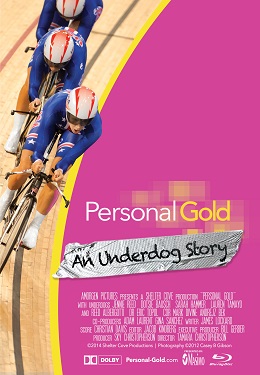[Rating: Rock Fist Way Down]
 Personal Gold is a paint-by-numbers documentary that not only fails in its attempt to tell an interesting story, but also surrenders its narrative to what amounts to a flashy, well-produced infomercial. This is no small feat, for festivals and distributors are usually savvy enough to spot a shifty tonic salesman when he/she appears, yet Personal Gold slipped by using an inspirational Olympic story to cloak its push to promote their subject’s sponsors and volunteers. Indeed, after about thirty minutes of this garbage, a viewer might begin to wonder when the Amway pitch is going to surface.
Personal Gold is a paint-by-numbers documentary that not only fails in its attempt to tell an interesting story, but also surrenders its narrative to what amounts to a flashy, well-produced infomercial. This is no small feat, for festivals and distributors are usually savvy enough to spot a shifty tonic salesman when he/she appears, yet Personal Gold slipped by using an inspirational Olympic story to cloak its push to promote their subject’s sponsors and volunteers. Indeed, after about thirty minutes of this garbage, a viewer might begin to wonder when the Amway pitch is going to surface.
When documentaries are done well, they offer a complex, multi-faceted story that encourages viewers to engage in the consideration of different issues they might not have otherwise thought about. When documentaries are done poorly, as is the case with Personal Gold, they are little more than a visual book report, with pre-established conclusions and piles of supporting evidence to hammer home the point. Right from the start of the picture, a person can catch a whiff of the latter end of this spectrum, mostly through the fog of moving testimonials about the U.S. women’s track cycling squad. Nobody believed they had a chance to win in the Olympics, and interest in cycling had taken a nosedive following the Lance Armstrong doping scandal…and this is their story.
 Underdog sports films and docu-dramas have been done to death, and largely follow a similar narrative and beat-structure that Personal Gold runs into the ground. Underfunded, under-supported, and composed of a mixed bag of athletes that don’t fit the traditional mold, the U.S. women’s track cycling team had to make due with less, learn to come together, and benefit from a larger community that rallied behind them. None of this is particularly fresh, especially if somebody has basic cable and has seen Major League, Rocky, The Bad News Bears, or the countless other flicks that have aped this formula to death. Right from the beginning of Personal Gold, the audience is told who to root for, why they should be doing so, and the outcome they should look forward to, leaving little room for critical analysis or introspective thought.
Underdog sports films and docu-dramas have been done to death, and largely follow a similar narrative and beat-structure that Personal Gold runs into the ground. Underfunded, under-supported, and composed of a mixed bag of athletes that don’t fit the traditional mold, the U.S. women’s track cycling team had to make due with less, learn to come together, and benefit from a larger community that rallied behind them. None of this is particularly fresh, especially if somebody has basic cable and has seen Major League, Rocky, The Bad News Bears, or the countless other flicks that have aped this formula to death. Right from the beginning of Personal Gold, the audience is told who to root for, why they should be doing so, and the outcome they should look forward to, leaving little room for critical analysis or introspective thought.
Alex Gibney’s film, The Armstrong Lie, delves into the murky and often confusing world of professional cycling without passing judgment or lauding any one person or viewpoint. It examines Lance Armstrong’s career within the context of professional cycling as a whole, and draws from multiple sources to paint a complicated picture of the professional athletes involved, and the mind-boggling decisions they are often forced to make. In that documentary, issues of personal and professional responsibility are weighed against professional survival and the state of competitive cycling as a business over the last few decades. This forces its audience to reconsider what they think they know about Lance Armstrong, Floyd Landis, the Tour de France, and competitive athletics in general. Personal Gold has no such ambition, and narrows its focus to a single-track narrative with almost no room to maneuver.
 As unfortunate as this is, when it becomes clear that Personal Gold is not simply a formulaic underdog sports story, but also a medical technology and hardware commercial, things go from bad to worse. The film flatly explains that the 2012 women’s Olympic track cycling team had minimal funding, little non-familial support (the riders’ husbands did a lot of that work), and a considerable gap to cover to bring the team’s skills up to par with the competition. The fact that the U.S. squad was able to contend on the Olympic level had a great deal to do with volunteer contributions from computer data experts, nutritionists, physicians, and even a Navy S.E.A.L. Now, the women’s track cycling team couldn’t really pay these people, yet as Personal Gold moves out of its first act, a viewer gets the sense that the documentary is itself a sort of attempt at delayed compensation.
As unfortunate as this is, when it becomes clear that Personal Gold is not simply a formulaic underdog sports story, but also a medical technology and hardware commercial, things go from bad to worse. The film flatly explains that the 2012 women’s Olympic track cycling team had minimal funding, little non-familial support (the riders’ husbands did a lot of that work), and a considerable gap to cover to bring the team’s skills up to par with the competition. The fact that the U.S. squad was able to contend on the Olympic level had a great deal to do with volunteer contributions from computer data experts, nutritionists, physicians, and even a Navy S.E.A.L. Now, the women’s track cycling team couldn’t really pay these people, yet as Personal Gold moves out of its first act, a viewer gets the sense that the documentary is itself a sort of attempt at delayed compensation.
Early on, a large chunk of time is spent expounding the virtues of Dr. Eric Propol’s R&D work in tracking athletic metrics at the micro level, yet it takes thirty minutes for the film to explain anything about the rules and goals of track cycling. Not to be redundant, but that’s worth repeating: it takes a half hour for Personal Gold to explain anything about the particulars of the sport it features, by which point several glowing testimonials for the film’s leading contributor have already been put before the audience. This is like going to a baseball game that has a 20-minute time-share pitch before the first at-bat, and again between every half-inning. And as frustrating as all these testimonials are as hurdles for the larger narrative, they’re doubly galling when viewed for what they really are: an underhanded attempt to sell something to people who just wanted to watch a movie.
More could be written on the total abject failure that is Personal Gold, yet to continue would border on cruelty. The athletes featured in the film don’t deserve to be dragged down in a cloud of cinematic criticism, for their efforts and actions at the 2012 Olympics were admirable, and are an inspiration to anyone with a dream and a seemingly impossible road to the finish line. It’s just too bad that their story got lumped in with a glorified QVC documentary pimping the latest wares in high-tech athletic training. Currently playing at the Seattle International Film Festival, Personal Gold is just that: a personal experience gilded in the minds of those who participated and filmed it. For anyone else watching, it’s an infomercial wrapped in a rote exercise in pedantic feel-good documentary filmmaking.





{ 2 comments }
It’s obvious that this reviewer missed one of the main messages of this film – perhaps it was too subtle for the meathooks he uses to write with. The motivation for the film was born out of the experiences of 3 Olympians – Sky and Tamara Christopherson , and Adam Laurent, all who experienced training methods that treated them like objects rather than whole humans. What they devised on behalf of the 2012 American Women’s Tracksaarr Cycling team, in concert with professionals like Dr. Propol, is integrated training that considers the whole person in undrugged states (e.g., anti-Armstrongs). That, combined with the grit of the athletes, led to the unexpected Silver medal for these deserving young women and their families who could legitimately claim a share of the award.
I don’t know what’s wrong with Cantrell’s judgment, but in my mind, that’s a hell of a story. He seems particularly deluded when he compares this film with Rocky and The Bad News Bears, apparently missing the point that those are works of fiction, while Personal Gold is about real people, sweating real sweat and crying real tears of pain and joy.
Finally, Cantrell needs editorial help, as well: it’s not “make due” – it’s “make do.” Which the 2012 Women’s track cycling team did magnificantly and this film does a great job of memorializing.
My apologies for not liking this sporting infomercial more than I did. The fact that it went on to such critical acclaim and such wide distribution means that I must have really missed the mark on….oh, wait a second. Yeah, that didn’t happen. I guess the majority of people thought it sucked just as much (if not more) than I did. Minus the one typo you found, I think I’ll stand by my original assessment.
Comments on this entry are closed.